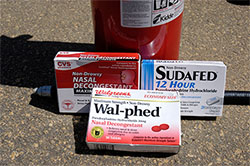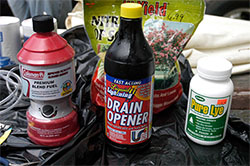 Criminals can cook meth using a variety of household and consumer products.
Criminals can cook meth using a variety of household and consumer products.
The key ingredient is pseudoephedrine, found in many nonprescription cold medications. To combat meth production, North Carolina law only allows cold medications with this ingredient to be sold from behind a pharmacy counter.
You must be at least 18 years old and present a photo ID in order to buy these products. You're also limited to purchasing no more than 3.6 grams of pseudoephedrine in 24 hours or 9 grams of pseudoephedrine in 30 days.
Under state law, North Carolina pharmacies use an electronic tracking system to log all purchases of products containing pseudoephedrine. This lets the retailer know if the buyer has reached the legal limit so the store can stop the sale.
The electronic system, called NPLEx, links pharmacies in more than 30 states and stops tens of thousands of questionable purchases in North Carolina each year. This law is helping to reduce the number of meth labs in North Carolina.
 Products that can be used in meth labs include:
Products that can be used in meth labs include:
- Pseudoephedrine (found in cold medicines)
- Camp fuel
- Lighter fluid
- Lye/Sodium hydroxide
- Drain Cleaner
- Rubbing or denatured alcohol
- Instant cold compresses
- Paint thinner (Xylene)
- Toluene
- Starter fluid
- Lithium metal (from lithium batteries)
- Sulfuric acid drain opener
- Muriatic acid (pool acid)
- Acetone
- Table salt or rock salts
- Tincture of Iodine
- Matches (books or boxes)
- Anhydrous ammonia (a gas often stored in tanks and stolen from farmers who use it for legal purposes)